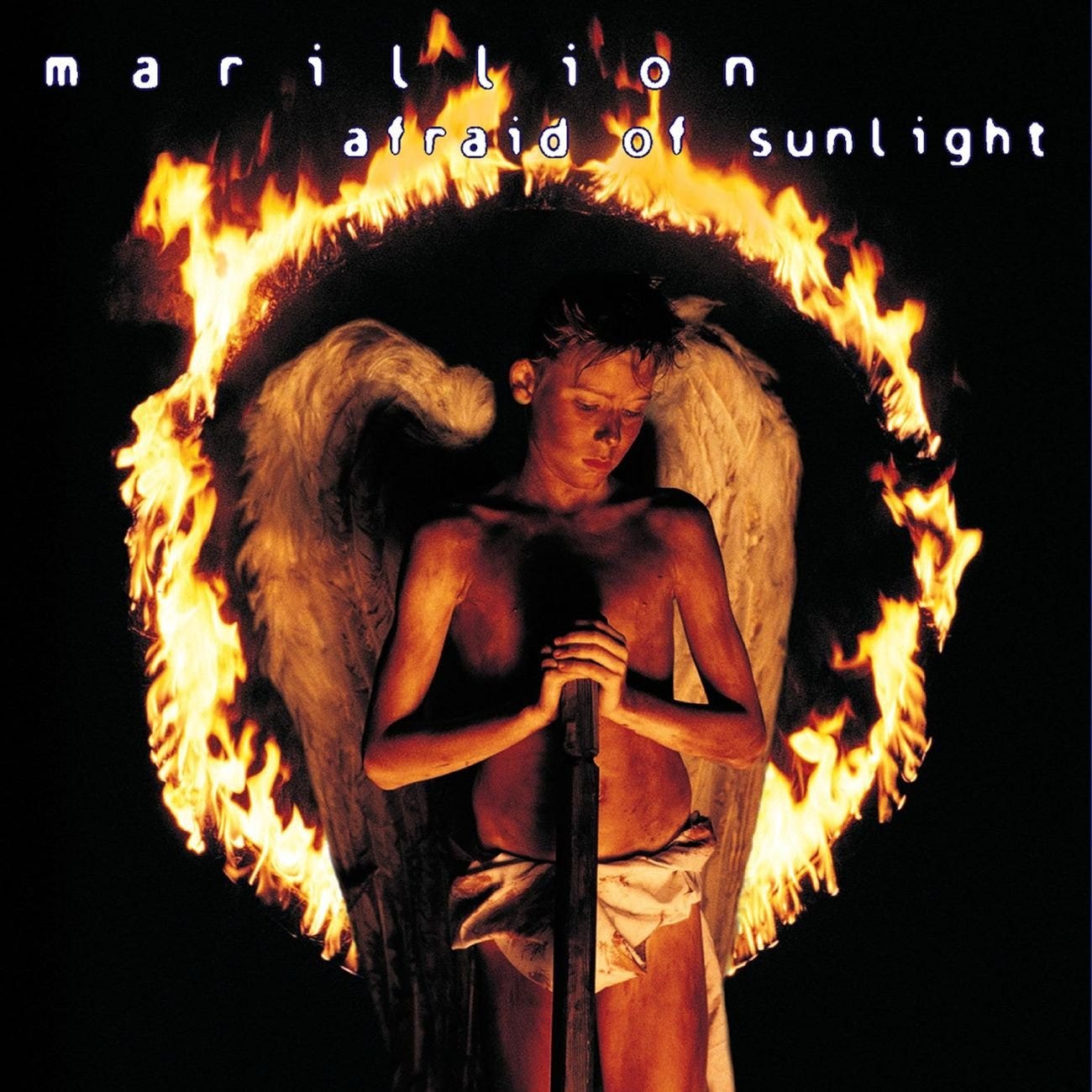[Dear Substack Reader, as always a huge thank you for sticking with me. I’m having a blast, and I hope you are as well. Here’s a piece I wrote for Winston Elliott’s The Imaginative Conservative when Afraid of Sunlight was 25. Five years later, I still feel the same. If you’re new to progressive rock or to Marillion, there’s no better place to start than with this album. Below are my personal thoughts on it. Yours, faithfully, Brad]
With immense pressure from the band’s label, EMI, to “produce a hit,” Marillion released its eighth studio album, Afraid of Sunlight, in the early summer of 1995, twenty-five years ago. Written much faster than the previous meticulous concept album, 1994’s Brave, Afraid of Sunlightoffered eight diverse tracks with a total run time of just fifty-one and ½ minutes. Adventurous from the opening boisterous note of track one to the longing final note of track eight, the album is pure Marillion, but with serious notes toward some of pop music’s greats, such as the Beach Boys (with a direct reference to the reclusive Brian Wilson) and the Beatles. Not surprisingly, given the title, Marillion tried to capture ideas of the press, public revelation, and celebrity. What was truly surprising, though, was Marillion’s equally tenacious attempt to write a rock album dedicated—at times, rather blatantly—to pursuing the good, the true, and the beautiful. Indeed, the entire album centers around its middle tracks—”Beautiful,” “Afraid of Sunrise,” “Out of this World,” and “Afraid of Sunlight”—bracketed by two tracks at the beginning of the album, and two at the end.
At this point, it might be worth pausing (and, I have decided that it is worth it) and asking just why I might be writing such an essay for The Imaginative Conservative, as rock music has appeared only every so often in the ten years of TIC’s existence.
Let me try to explain.
As far back as I can remember, I have loved music. My house and childhood were filled with it from my earliest memories. There was always a classical, a jazz, or a rock album playing, and, sometimes, even musicals. We turned to the stereo system more readily than to the TV. I personally loved music so much, that even as a toddler, I would crawl out of bed, go down the stairs, and play the family stereo system at full blast in the middle of the night, waking up the whole household. My mom and my brothers would come down the stairs of our split-level ranch in Great Bend, Kansas—so I’m told—to find me dancing wildly.
Cute. But annoying, I’m sure.
Regardless, music has shaped my imagination and my worldview as much as anything. In 1972 or 1973, when I was five or six, I came across the triple-gatefold album of Yes’s live set, Yessongs, filled with paintings by Roger Dean. I was immediately drawn into what is now known as progressive rock—extended chamberlike rock music and extended symphonic rock suites based, quite often, on European song structures and African jazz rhythms and time signatures, often telling complex stories through the lyrics.
In the 1980s, Marillion emerged as one of the world’s leading prog bands, but, in the late 1980s, the band lost its lead singer, replacing him with the brilliant Steve Hogarth. The music of the band changed, going from staccato-esque precision to lush romanticism. Both iterations of the band were, certainly, progressive rock, but in radically different ways. The first iteration was exact, while the second was (and is) fluid. Afraid of Sunlight might be the second iteration of the band’s most romantic album.
Take these lyrics from track three, “Beautiful,” expressing the desire to be unashamed of loving what is good and true in this world, whatever the crowd might say.
You strong enough to be..
Have you the faith to be..
Have you the courage to be..
Honest enough to say..Don’t have to be the same..
Don’t have to be this way
Come on and sign your name
You wild enough to remain beautiful?
Or, Stoic resignation in track four, “Afraid of Sunrise”:
Day-Glo Jesus on the dash
Scorch marks on the road ahead
Friendly fire in hostile waters
Keep the faith, don’t lose your head
Don’t lose your head
So how do we now come to be afraid of sunlight
Afraid of Sunlight
Agave flower
Sleep beside me
Driving on
Nevada’s burning
Phoenix rising
Driving on
To sunlight
Or, daring to be great and excellent in track five, “Out of this World”:
So we live you and I
Either side of the edge
And we run and we scream
With the dilated stare
Of obsession and dreaming
What the hell do we want
Is it only to go
Where nobody has gone
A better way than the herd
Sing a different song
Till you’re running the ledge
To the gasp from the crowd
Spinning round in your head
Everything that she said
And, finally resolving in track six, “Afraid of Sunlight”:
All your spirit rack abuses
Come to haunt you back by day
All your Byzantine excuses
Given time, given you awayDon’t be surprised when daylight comes
To find that memory prick your thumbs
You’ll tell them where we run to hide
I’m already dead
It’s a matter of time
Each of these four tracks builds in soulful intensity and bardic purpose until Mr. Hogarth is begging us to answer, “how do we now come to be afraid of sunlight”? It is a plea for a recognition of the human condition, in all of its majesty and tragedy.
As some of you know, and I’ve shared from time to time, my wife and I lost a daughter in August 2007. She had come to full term—two days plus nine months, in fact—when she became entangled in her own umbilical cord. Cecilia Rose. Amazingly enough, we have a cemetery across the street from us, and we buried her not far from our house.
For that first year after her death, I was a complete and total wreck. I would visit her grave daily and lose my voice screaming at God. After all, as a father, God gives us one really important job: raise, protect, and nurture your children. But, He took her away from us, and I was at a complete loss as to why, left with an indescribable emptiness and unremitting remorse. The only thing that kept me totally calm—Marillion’s Afraid of Sunlight playing on my iPod. After my screamfests led to exhaustion, I would lie across Cecilia’s grave, stare into the sky, and listen to Afraid of Sunlight. The words came to take on a religious significance for me, and I owe the band and their album more than I could ever express in this world.
[Dear Substack Reader, I’m back. If you’re interested in Marillion, go to either Marillion.com or my favorite online retailer, Burning Shed, to make your purchases. Yours, Brad]






Bradley, I am a listening ear if you ever need one. We lost six (Jennifer and I) and then we adopted one, giving us a total of three to love to and cherish down here. Unlike your profoundly sad loss, ours were early miscarriages. When we first had questions God sent me a dream and I saw Monica, our first girl, in heaven. This sighting was confirmed soon thereafter.
I have no doubt that Cecilia Rose and our Miriam Rose are in a land of loving wonder.
As I posted today in Before the Invasion, the soon to be Fab Four played for early two months across from St. Joseph's Church in the St. Pauli district of Hamburg. This gig at the Kaiserkeller would 'prove' them.
I remember this article from its first publication. Your recounting of your grief still elicits great sympathy, though of course you wrote about it for for another reason entirely, and a very laudable one.
Marillion is a great band. I listen only to the albums with Fish as vocalist, however. I think that the songwriting and musical arrangements of the Hogarth-era albums are terrific. Unfortunately, I just don't like Steve Hogarth's vocals at all. It is not that he's not Fish; of course I like dozens of other prog singers; I just cannot appreciate or enjoy Hogarth's voice or his vocal style. 'Tis a pity!